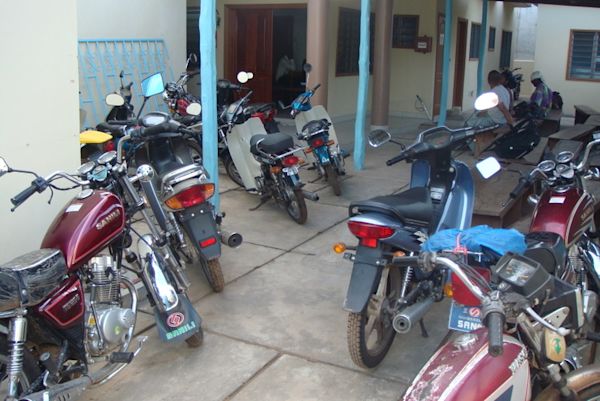
By Frederic Billou, KF13, Benin
As a Kiva Fellow working with loan officers from ALIDe, Kiva’s partner in that country, I am fortunate to spend a lot of time in the field, visiting many Kiva borrowers.
As mentioned in part 1, the vast majority of people relying on micro loans are extremely dedicated to repaying their loans on time. While one may think that people with such limited resources are higher risk, the fact that their loans actually insure their subsistence in most cases makes it quite literally vital for them to remain on track. In fact, since micro loans are often at first their only access to capital, it’s critically important for them in building a credit history which can enable them to get a larger future loan and finally break out of the poverty cycle.
In fact, at the time of this writing, Kiva’s global repayment rate current stands at 98.99% and ALIDe’s repayment rate stands at 100%.
Despite the best intentions, from time to time a client is late with their repayment and it’s time to do a “recouvrement inter-agence” (“inter-branch collection”). Simply put, 10 loan officers from the different ALIDe branches get together with one of the branch managers and hit the road on their mopeds to visit some of the delinquent clients for that specific branch together. The purpose is to better understand the reasons why these payments are late and to define a go-forward strategy. Invited to join just such a recovery expedition (that meant arriving at 7:00am at a branch across town..), here is the first thing I saw:
While there are usually a lot of mopeds and motorcycles in the courtyard, this many this early was unusual. Knowing what was in store, I paused to smile at this local “bumper sticker”…it basically means “the blood of Jesus is protecting me”. And of course, the other sticker below provided extra food for thought:
The approach to a recovery mission is very well choreographed. It basically relies on the time-tested “good cop-bad cop” strategy: the loan officer who has built the relationship with the client leads the team to the borrower’s house and plays good cop. The posse parks its motorcycles in front in full view of the entire neighborhood, half of the group remaining outside to answer neighbors’ questions and apply a bit of indirect peer pressure on the borrower. The branch manager, playing bad cop in a suit and tie, also stays outside. Once the good cop loan officer has assessed the situation, the branch manager walks in with the remaining loan officers. Of course, since the borrower has never met the “boss” or these specific loan officers before, this adds a bit an additional pressure as well.
But visiting clients to collect late payments doesn’t necessarily equal a solemn atmosphere. One client who noticed me, the “Yovo” (the “white guy” in the local dialect), in the bunch of agents, pointed at me and laughing, said to the “real” loan officers: “Oh I see, you were afraid you would not be able to recover the money, so you brought a Yovo with you”… The group busted out laughing and that’s when she delivered the punch line -with a timing so perfect she would have made Seinfeld proud- …”because, as we know, the Yovos sure know how to steal from us!” The entire group was on the floor by then, including the client and yours truly.
During our mission (we visited 10 clients), we were able to recover late payments on the spot from 2 clients, get agreements from 6 borrowers to come to the office the next day and repay their missed payments (they all did, including the lady above) and left convocations for 2 clients who were not at home.
How much a microfinance institution must try and get the loans repaid is always an interesting question. In my (and others’) mind, the only way microfinance can be successful is if microfinance institutions such as ALIDe are self-sustained and can reach more clients over time, making an ever bigger difference. Based on my interaction with ALIDe, I am not surprised that they currently have a 100% repayment rate: they build a true relationship with their borrowers, bundle their lending with a very social approach that includes mandatory financial training as well as free classes on social topics such as nutrition etc…During the recent floods, they also offered water-purifying tablets.
In conclusion, I thought a sign posted on the back of the window (ie facing the teller) at one of the “centre de decaissement” (where the borrowers come to collect the cash initially and bring their repayments) provided an interesting perspective on this Kiva partner.
It stated:
- If you lose money, you don’t lose anything
- If you lose your health, you lose something
- But if you lose your courage, you lose it all
Frederic Billou is a Roaming Kiva Fellow currently working in Benin.
PREVIOUS ARTICLE
4,107 Beans: A Kiva Fellowship in Numbers →NEXT ARTICLE
First Kiva Lending Team To Reach $3 million in Loans! →
















